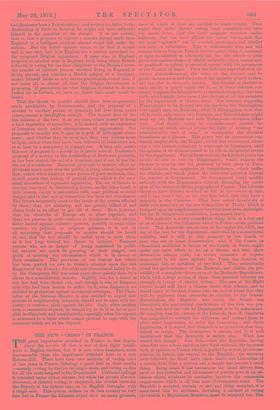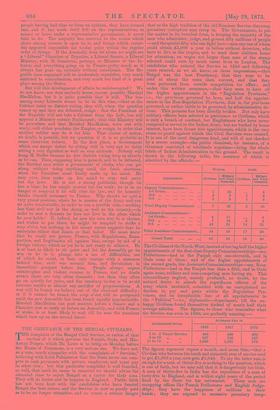THE NEW " CRISIS " IN FRANCE.
T' great importance attached in France to this dispute about the scrutin de liste is not at first sight intern- uible to English readers, but it is not, when examined, more 'unreasonable than the importance attached here to a new Reform Bill. There have been two methods of voting tried of late years in France, differing a good deal in their results —namely, voting by district for tingle seats, and voting en bloc for all the seats assigned to the Department. Universal suffrage is conceded under either scheme, but when the serutin d'arron- dissement, or district voting, is employed, the elector votes for the Deputy of his district only, as in English boroughs with a single seat. This system strikes us in this country as very fair, but in France the Liberals object to it on many grounds,
three of which at least are entitled to much weight. They argue that under district voting local considerations have too much force, that the local magnate exercises undue influence, that the local official can coerce voters, and that the local " agitator " can be worried, persecuted, and libelled into exile or submission. This is undoubtedly true, and will remain true so long as French Governments think it necessary or right to interfere in elections, and the law affords so little protection against abuses of official authority, which cannot now be punished, or indeed prosecuted, except with the permission of the Council of State. Then the Liberals urge that with the scrutin d'arrondissement, the votes of the electors may be partly thrown away and the force of the majority greatly broken, and this also is obviously correct. The number of electors in each district is nearly equal, but if, as in town districts con- stantly happens, the Liberals have a four-sixths majority, the extra sixth, which might have turned the election of all the members for the department, is thrown away. For instance, supposing Warwickshire to be divided into six districts, the Birmingham vote might carry six Radicals ; while if Birmingham were shut off, it could only return two Deputies, and Warwickshire might send up two Radicals and four Tories,—an enormous differ- ence. And finally, voting by arrondissement enables the Government, which always retains the right of revising "the administrative unit of area," to manipulate the electoral boundaries as it pleases. This power was an instrument con- stantly employed by the Empire, which was accustomed when- ever a city became refractory to rearrange its boundaries, until the opinion of its citizens ceased to be felt in the general return for the department. For all these reasons, the Liberals prefer the scrutin de lige or vote by Departments, which enables the electors to vote for the list prepared by each party in Paris, which reduces the magnates to insignificance, which baffles the officials, and which places the boundary question beyond the control of Government. No Government could meddle seriously with the Departments without deranging the entire plan of the accepted official geography of France. The Liberals therefore have decided to stand or fall by the scrutin de lisle, and it has turned out, on the very first trial, that they have a majority in the Chamber. They have seated twenty-six of their own members on the new Committee of Thirty, which is to report upon the supplementary Constitutional laws, and might, but for M. Gambetta's moderation, have seated thirty.
This majority is a very remarkable thing, both as a fact and as an evidence of the influences which in France create political force. This Assembly was, so late as November 20, 1873, the day of the vote for the Septennate, controlled by a monarchical majority, and is still to this moment in the hands of men who are at heart Conservative, who, if the Comte de Chambord abdicated in favour of the Comte de Paris, might make one more effort to set up a throne, and who show themselves always ready for severe measures of reprea- sion,—that is, for laws against the Press the freedom of municipal life, or agitation of any kind. They undoubtedly dread the predominance of the Radicals and dislike the pro-
bability of a complete victory even of the Radicals, Republicans, while with a large section of them their personal interests are strongly in favour of district voting. The men of the Right Centre would still have a chance under that scheme and so would many of the Left Centre who are now in hopes that they will be reprieved from obscurity by election to the Senate. Nevertheless, the Republic was voted, the Senate was liberalised, the preferential candidature of the rich was pre- vented, and now the vote by Departments is to be maintained. So complete was the victory of the Liberals, that M. Gambetta was compelled to restrain his followers, and counsel them to allow some Legitimists to enter the Committee ; and these Legitimists, it is stated, feel themselves so powerless that they intend to resign. The Committee is secure, and it is well understood that the Assembly is secure also. What has caused this change ? Just this,—that the Republic, having come first into actual and then into legal existence, the immense body of opinion in France which is guided by events, by circum- stances by habits, has swayed to the Republic ; the waverera have followed, the timid have taken heart, and Liberalism of a certain kind from a portent and a danger has become a usual thing. Being usual, it has become, as the usual always deco, more or less powerful, and all manner of persons give in an ad- hesion which, whatever its cordiality, involves the reasonable acquiescence which is all that most Governments want. The Republic is accepted, warmly or not, and being accepted, it is considered that its accidents, including a method of voting favourable to Republican Members, must be accepted too. The
people having had time to form an opinion, they have formed one, and it has made itself felt on the representatives, as sooner or later, under a representative government, it never fails to do. The majority has swerved to the course which alone among courses is open to it, and things which yester- day appeared impossible are to-day quite within the regular order of things. If the Assembly were let alone, we might see a "Liberal" Chamber of Deputies, a Liberal Senate, a Liberal Ministry, with M. Gambetta, perhaps, as Minister of the In- terior, and everything going on in France pretty much as it always has gone on, certainly without cataclysms. The Re- public once organised will be moderately repressive, very much addicted to centralisation, and very much too fond of a great place among the States. But will this development of affairs be uninterrupted ? We do not know, nor does anybody know, except possibly Marshal MacMahon, but it is quite possible that it will. The fear
among many Liberals seems to be in this wise,—that- as the Cabinet insist on district voting, they will, when the question conies up and they are defeated, resign ; that the President of the Republic will not take a Cabinet from the Left, but will appoint a Ministry outside Parliament ; that this Ministry, will be powerless, and that Marshal MacMahon, worn out with worry, will either proclaim the Empire, or resign, in order that another soldier may do it for him. That course of action, no doubt, is possible, but we question if it is so probable as some observers believe. In the first place, a Government which can escape defeat by sitting still is very apt to think sitting a very dignified as well as easy attitude. Nobody will hang M. Buffet because he lets district voting drop as silently as he can. Then, supposing him to press it, and to be defeated, the Marshal may select a government of clerks, who can get along without doing anything until the fresh elections, when the President must finally make up his mind. He may even then make up his mind to stay, and carry out the laws. He is not a strong politician, though he has a bias; he has ample powers for his work; he is in no danger of removal if he will obey the law, and he honestly thinks himself necessary to France. Why should he quit a very proud position, where he is master of the Army and can sit quite comfortably, in order to run a terrible risk,—nothing less than civil war in the Army, as well as the country,—in order to seat a dynasty he does not love in the place which he now holds? If, indeed, he sees his own way to a throne, and wishes to get there, he might be tempted to strike a coup d'e'tut, but nothing in his recent career suggests that he entertains either that desire or that belief. He must know that he could not govern France, with Republicans, Bona- partists, and Legitimists all against him, except by aid of a foreign victory, which as yet he is not ready to achieve. He is at least as likely to sit quiet and let the Assembly go its way as he is to plunge into a sea of difficulties, out of which he could, at best, only emerge with a massacre behind him, civil war around him, and Revolution in immediate prospect before him. People always expect catastrophes and violent courses in France, and no doubt events there are very often dramatic ; but then they often go on quietly for years, and the tendency to-day is to avoid extreme results at almost any sacrifice of prepossessions. A way will be found, we believe, out of the electoral difficulty; or if it cannot be found, the coup deka will be postponed until the new Assembly has been found equally impracticable. Marshal MacMahon can post sentries before a Senate and a Chamber just as easily as before an Assembly, and with France at stake, is at least likely to wait till he sees the numbers which turn up on the second throw.



































 Previous page
Previous page